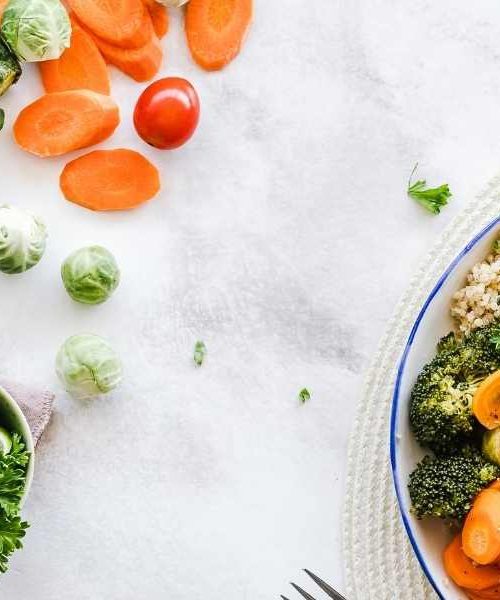What to eat before and during IVF
What you eat can directly affect your reproductive functions in several ways, and research has shown that many lifestyle factors have a significant impact on your health and fertility.
We asked Dr Ewa Goncikowska to explore the role of diet in IVF and what you should or should not be eating whilst preparing for, and undergoing treatment.
What should I be eating when going through IVF?
Eating healthily when you are planning or undergoing IVF treatment can be a challenge, especially if you are juggling for time or are constantly on the go.
Whilst there are no specific “fertility foods”, eating a nutritious and well-balanced diet contributes to overall well-being and reproductive health.
Ensuring you eat well and focusing on your nutritional intake can help regulate hormones, lower stress levels, and improve your overall health.
In this blog, Dr Ewa Goncikowska explores the role of diet in IVF and what you should or should not be eating whilst undergoing treatment.
What should I eat during IVF?
What you eat can directly affect your reproductive functions in several ways, and research has shown that many lifestyle factors have a significant impact on your health and fertility.
In addition to cutting down or giving up habits such as smoking and drinking alcohol, research has shown that a diet rich in proteins, healthy fats, whole grains, and vegetables can positively impact fertility.
More importantly, eating too much sugar, sweets, trans fats, and red meat can have negative effects.
Adopting a diet rich in plant-based foods, whole grains, fruits, vegetables, and healthy unsaturated fats, such as a Mediterranean diet, provides crucial nutrients to improve fertility outcomes.
Mediterranean diet and IVF – does it help?
While there is no such thing as an “IVF diet”, nutrition does play a role. Adopting a diet like the Mediterranean diet will not only contribute to your overall health but can also be a powerful boost for your fertility.
The Mediterranean diet involves eating plant-based meals full of healthy proteins, vegetables, beans, and legumes, consuming ample amounts of healthy fats and omega-3 fish oils such as extra virgin olive oil and fish, and limiting red meat and refined sugar.
How essential fatty acids can help fertility
Essential fatty acids are not produced in the body, so you need to get them from dietary sources. Fish, nuts, and seeds are rich in omega-3 fatty acids. They may reduce inflammation in the body and may protect egg and sperm quality.
Research shows that women taking omega-3 supplements are 50% more likely to conceive than women not taking omega-3. Intake of this essential fat also increases the probability of pregnancy following IVF; for example, in improving embryo quality.
Eating lean proteins boosts your fertility
High meat intake has been associated with ovulatory dysfunction whilst intake of fish, eggs, and vegetable proteins may reduce the risk and improve outcomes in fertility treatment.
We recommend that you avoid processed meats, reduce your consumption of red meats, and add fish and plant-based proteins to your diet. When consuming fish, choose those with low mercury levels and high concentrations of polyunsaturated fatty acids. The American College of Obstetricians and Gynaecologists recommend that women trying to conceive or who are pregnant eat two to three servings of a variety of fish per week, with no more than one serving per week of fish such as albacore tuna, and avoid fish with the highest mercury concentrations (bigeye tuna, king mackerel, swordfish).1
What fruits and vegetables help fertility?
No single fruit or vegetable can provide everything you need. It is important to eat a wide variety to provide the body with antioxidants such as vitamins C, E, and carotenoids, and they show the greatest benefit in combination with other nutrients and antioxidants.
Antioxidants are important to neutralise the action of free radicals. Free radicals are produced as a by-product of turning food into energy (metabolism), as well as other factors such as exercise, smoking, pollution, and sunlight. Free radicals can cause oxidative stress which damages cells including the egg and sperm.
The best sources of antioxidants come from brightly coloured fruits and vegetables like berries, beets, bell peppers, oranges, avocados, and seeds.
What should I avoid eating during IVF?
Trans fats, alcohol, caffeine, and sugar have all been associated with adverse fertility outcomes for a variety of reasons.
Trans fats
It is recommended that you reduce trans fats in your diet if you are trying to conceive or undergo fertility treatment. These man-made fats are found primarily in partially hydrogenated vegetable oils used in highly processed foods such as chips, biscuits, cakes, fried foods, and pizza.
Trans fats may affect egg quality and cause ovulatory infertility by contributing to metabolic syndrome which in turn is associated with insulin resistance and disrupted ovulation. In addition, trans fats increase the risk of coronary heart disease.
Alcohol
Alcohol consumption in pregnancy has been linked to increased risk of miscarriage and stillbirth, and decreased chance of livebirth. Heavy alcohol intake can affect your ovarian reserve and disrupt ovulation and menstrual cycles in women trying to conceive.
Research varies on how much is safe to consume when trying to conceive, but we would recommend abstaining from alcohol if you are trying to conceive or whilst undergoing fertility treatment, to give you the best chances of success.
Caffeine
Caffeine has antioxidant and anti-inflammatory properties, but excessive intake can have long-term side effects. High caffeine intake has been linked to difficulty conceiving, miscarriage, and low birth weight, but the evidence is weak.
If you are trying to get pregnant or are about to start IVF, we recommend that you reduce your caffeine consumption to a daily limit of 200mg.
Tea and coffee contain polyphenols which may reduce the amount of iron you absorb, so try to avoid having these one hour before and after your meals.
These small changes can play a crucial role in optimising your reproductive health.
Sugar
Consumption of sugar and artificial sweeteners such as in sugar-sweetened drinks, has been associated with lower pregnancy rates. This may be explained by increased insulin resistance and disruption of ovulation.
We recommend reducing your daily sugar intake, particularly in women with polycystic ovarian syndrome, to help improve menstrual cycles and reduce insulin resistance. Restricting your sugar intake will also reduce the risk of gestational weight gain and complications in pregnancy such as gestational diabetes, pre-eclampsia, and preterm birth.
How to eat on the go when you are having IVF
Being selective about healthy meals and snacks in our busy daily lives can be tricky as options may sometimes be limited. To help with this, try to pack some snacks and a meal for your trip so you will have something ready when you need it.
Stock up on healthy snacks that you can grab and go. Preparing your snacks ahead of time can help you stay on track with eating healthily even when you are in a hurry.
Try dividing larger bags of almonds, dried fruit, or cut-up vegetables into individual portions and keep a few in your bag for when you are on the go.
Dining out when you are having IVF
When eating out, one of the best ways to stick to a healthy diet is to dine in restaurants that offer fresh ingredients and lots of vegetable options.
Try to opt for dishes made with lean proteins, whole grains, and lots of veggies. You could also try to swap unhealthy sides like chips for healthier options like a side salad or grilled vegetables.
Meal prepping for IVF
It can be helpful to plan your meals ahead of time, making it easier to stay on track with healthy eating, and avoiding the temptation to grab something quickly that may not be so good for you.
If you know when and where you will be eating, you could plan ahead by packing a lunch or researching options for healthier restaurants.
Quick IVF – friendly meals
If you have limited time for cooking, try to look for meals that are quick and easy to prepare. Search for recipes that require only a few ingredients or can be prepped ahead of time, so that you don’t have to spend too much time in the kitchen.
Consider making double batches of recipes like soups, stews, or casseroles so you can have leftovers for lunch or dinner the following day.
See our post on fertility-friendly breakfast ideas here.
Foods to eat after an embryo transfer
We recommend that you eat in the same way you would if you were pregnant; for example, reducing your sugar intake, limiting caffeine, cutting out alcohol, and trying to get more whole grains in your diet.
In general, eat foods that are rich in protein, fibre, folic acid, and omega-3 fatty acids. These include leafy greens such as broccoli and sprouts, proteins such as eggs, beans, yoghurt, fish, and nuts, and high fibre such as oats and other whole grains.
References
American College of Obstetricians and Gynecologists. ACOG Practice advisory: update on seafood consumption during pregnancy. 2017. Available at: https://www.acog.org/Clinical-Guidance-and-Publications/Practice-Advisories/ACOG-Practice-Advisory-Seafood-Consumption-During-Pregnancy.


